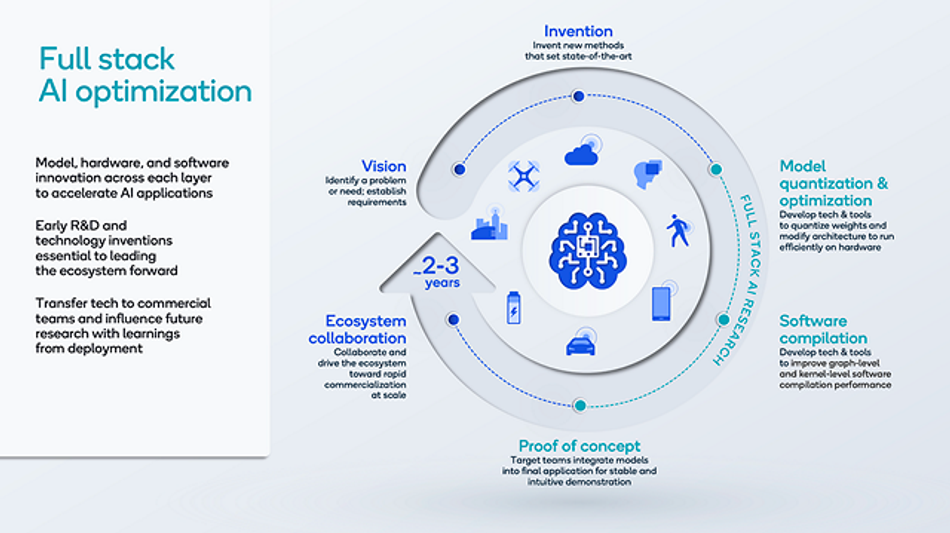Balancing the Cloud and the Edge: A Close look at Enabling Hybrid AI
Qualcomm's Pioneering Approach to Hybrid AI: Merging Cloud Processing with On-Device Efficiency and Scale
Artificial intelligence (AI) technologies have evolved in a new era where hybrid AI solutions are paramount in scaling generative AI technologies. These solutions, which balance the cloud's computational power with edge devices' immediacy and scale, are revolutionising how we process and analyse data. Qualcomm, a global leader in wireless technology and low-power on-device computing, has been at the forefront of this transformation, particularly in pioneering on-device Generative AI. Their innovations enhance device capabilities and provide efficient data processing, bridging the gap between cloud-based AI and real-time edge-device computations.1,2
The Hybrid AI Vision of Qualcomm
Qualcomm’s recent whitepaper titled "How our on-device AI leadership, global scale, and ecosystem enablement are making hybrid AI a reality" underscores the significance of a hybrid approach to AI, where processing is distributed between the cloud and devices. This hybrid AI architecture, championed by Qualcomm, promises unparalleled benefits in terms of cost, energy efficiency, performance, privacy, security, and global-scale personalization.
Qualcomm's leadership in on-device AI is evident in its hardware and software solutions tailored for edge devices. These solutions span many devices, from mobile phones to vehicles, extended reality headsets, personal computers, and IoT devices. Their hardware is renowned for its industry-leading performance per watt, with mobile solutions boasting performance metrics approximately two times higher than their competitors.
A cornerstone of Qualcomm's strategy is its full-stack AI optimization, which encompasses AI applications, models, hardware, and software. This comprehensive approach keeps them at the cutting edge of on-device AI solutions. Furthermore, Qualcomm's commitment to AI is not just about technological advancement. They envision an AI ecosystem grounded in transparency, accountability, fairness, and human-centricity. Their on-device AI solutions are purposely designed to prioritise user privacy and security.5
Collaborations and partnerships form a crucial part of Qualcomm's strategy. By focusing on ease of development and deployment, Qualcomm empowers developers and independent software vendors (ISVs) to create and optimise AI applications across many devices powered by Qualcomm and Snapdragon platforms. With its technological leadership, global reach, and commitment to ecosystem enablement, Qualcomm Technologies is at the forefront of making hybrid AI a tangible reality.5
Key Benefits of Qualcomm's Hybrid AI
Qualcomm's hybrid AI approach, which combines on-device and cloud-based processing, offers several distinct advantages3:
1. Privacy and Security: On-device AI inherently bolsters user privacy, as data remains confined to the device, reducing potential risks associated with data tracking, manipulation, and theft. This is especially crucial for sensitive applications like medical or enterprise solutions.
2. Performance: Qualcomm's on-device AI provides high processing performance and reduced application latency. With each technological generation, on-device processing performance has seen double-digit growth. This on-device processing eliminates potential latency issues caused by network congestion or cloud server delays, ensuring reliable and real-time AI processing.
3. Cost: As cloud providers grapple with the rising costs of running generative AI models, on-device AI presents a cost-effective solution. Consumers and cloud service providers can realise significant savings by offloading some AI tasks to edge devices.
4. Energy: On-device AI processing is energy-efficient, especially compared to cloud-based solutions. Efficient AI processing on edge devices reduces energy consumption and helps achieve environmental and sustainability goals.
5. Personalization: On-device generative AI enhances personalization by tailoring models and responses to a user's unique patterns and behaviours. This leads to a more personalised user experience, making devices like smartphones more user-centric.3
Real-world Applications
Qualcomm's on-device AI solutions have significantly progressed across various sectors. In mobile devices, Qualcomm's on-device AI provides efficient processing, enhancing user experience by providing real-time responses and personalised features.5 The automotive sector benefits from Qualcomm's AI solutions, which optimise vehicle performance, safety features, and in-car entertainment systems. Furthermore, Qualcomm's AI technologies can enable intelligent manufacturing processes, predictive maintenance, and enhanced supply chain management in the industrial IoT space, ensuring seamless operations and reduced operational costs.5
Future Prospects
Qualcomm's vision for AI's future is expansive, focusing on scaling generative AI worldwide. Their commitment to on-device AI is evident in their continuous research and development efforts, aiming to unlock the full potential of AI by distributing processing between the cloud and devices.6 Qualcomm's collaborations with other tech giants and their participation in global AI conferences, such as CVPR and NeurIPS, underscore their dedication to advancing AI research and bringing generative AI to the edge.7 With its technological leadership and global reach, Qualcomm is poised to lead the next wave of AI innovations, ensuring that the benefits of hybrid AI are realised across various sectors and applications.
Conclusion
Qualcomm's leadership in on-device AI is instrumental in advancing hybrid AI solutions, bridging the gap between cloud and edge devices. Their approach balances cost, energy, performance, privacy, security, and personalization, making AI more accessible and efficient globally.5 Qualcomm's technologies, particularly in on-device AI, are set to redefine the future of generative AI. By leveraging its full-stack AI optimization and collaborations with tech giants, Qualcomm provides AI processing that is powerful and power-efficient. 6
Qualcomm's commitment to transparency, accountability, and human-centric AI solutions further emphasises its vision for a future in which AI is seamlessly integrated into everyday devices, enhancing user experiences, privacy, and security.6 With their continuous innovations and global reach, Qualcomm is poised to lead the next wave of AI advancements, setting the stage for a more connected and intelligent world.
Join the Qualcomm “What’s Next in AI and Computing” newsletter.
References
1. Qualcomm: Wireless Technology & Innovation | Mobile Technology
3. 5 benefits of on-device generative AI
4. Qualcomm Artificial Intelligence | AI Machine Learning | Qualcomm
5. How our on-device AI leadership is making hybrid AI a reality
6. How on-device AI is enabling generative AI to scale
7. Qualcomm at CVPR 2023: Advancing research & bringing generative AI to the edge



